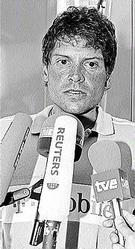
Ullrich BRUSSELS, Belgium (AP):
International Olympic Committee (IOC) President Jacques Rogge said yesterday he would strip 2000 Olympic cycling champion Jan Ullrich of his gold medal if he is found guilty of doping allegations.
"If I see proof that Jan Ullrich was doped during the Sydney Games when he won Olympic gold, I will rearrange the standings," Rogge told Het Laatste Nieuws. "The World Anti-Doping Agency allows us to go back eight years and I would certainly do so."
Ullrich has denied any involvement in doping, despite his DNA sample being matched in April to blood bags seized in a major Spanish doping investigation.
The IOC opened an investigation on May 30 into possible doping violations in cycling at previous Olympics following recent drug confessions by members of Ullrich's Telekom team. The German rider won the Olympic gold medal in the road race and silver in the time trial at the 2000 Sydney Games.
Performance-enhancing drugs
Several former riders of Team Telekom - including 1996 Tour de France winner Bjarne Riis, Erik Zabel and Rolf Aldag - admitted they used EPO during the 1990s. Two team doctors have admitted they gave performance-enhancing drugs to their riders.
Ullrich retired from cycling in February, 10 months after his name surfaced in Operation Puerto, which led to the 1997 Tour de France champion being excluded from last year's race.
Prompted by the Ullrich case, all 20 ProTour teams and all but a handful of their riders agreed in April to make DNA profiles available for testing in doping disputes.
Rogge said he was confident the sport would bounce back from the slew of doping scandals and that even people like Riis, who is now a team leader with Computer Sciences Corporation (CSC), can redeem themselves.
"I see that the CSC team of Bjarne Riis has a very strict anti-doping policy, with more controls than any other team," he told the newspaper.
Rogge said he backed the principle of plea-bargaining in doping cases even if the cycling's world governing body, the Union Cyclite Internationale (UCI), has said it would oppose any leniency in the case of Italian rider Ivan Basso.
Basso, the 2006 Giro d'Italia champion, was suspended by the Italian cycling federation last month after acknowledging involvement in Operation Puerto. He confessed to "attempted doping," but said he never actually went through with it.
The UCI wants Basso banned for the maximum two years. The Italian Olympic Committee recommended a 21-month suspension. A decision is expected Friday.
"If Basso or others give strategic, interesting information, things that contribute toward catching a network, than I back a prudent sentence reduction," Rogge said.

